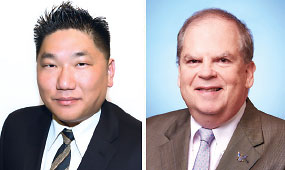APA’s Advocacy Work: Defying Physicians’ Promethean Fate
Abstract
APA is advocating for legislation that will help reduce physician burnout. This article is part of a series written by APA’s Council on Advocacy and Government Relations.
In Greek mythology, Prometheus was a titan that defied the gods by stealing fire and giving it to humanity, an act of compassion that ignited the human arts and sciences. His punishment was to remain chained to a rock. Every day an eagle would feed on his liver, which would grow back overnight to be eaten again the next day. The “moral injury” of punishment for trying to better humanity is the tale of Prometheus and physician burnout.

Daniel Cho, M.D., M.P.H., is chief resident of internal medicine/psychiatry at Charleston Area Medical Center/WVU-Charleston and president/chair of the APA/APAF Leadership Fellowship. David Diaz, M.D., is an associate professor of clinical psychiatry and program director for the C-L Psychiatry Fellowship at the Indiana University School of Medicine in Indianapolis. He is also president-elect of the Indiana Psychiatric Society and a member of APA’s Council on Advocacy and Government Relations.
While there are varying definitions of burnout, physician burnout has been increasingly recognized as a critical health care problem. The causes of physician burnout are multifaceted but often associated with the burden of education-related debt, limited workforce of health and mental health professionals, increasing threat of litigation, and burden of administrative tasks such as completing prior-authorization requests and fulfilling electronic health record criteria. Most accounts report that more than half of current health care professionals suffer from burnout to some extent, with one report showing rates of burnout among specialties ranging from 38% to 73%, with psychiatrists at a 48% burnout rate.
However, most research on this topic is dedicated to measuring prevalence and not identifying root causes. Part of the difficulty in clarifying the cause is the variety of ways that burnout can manifest. Measuring impaired personal relationships, rates of substance use and/or mental health disorders, reduced productivity, and diminished morale is difficult due to the reluctance of physicians to acknowledge their struggles. These are often perceived by colleagues and sometimes physicians themselves as signs of weakness, which further fuels concealment.
The most troubling manifestation is the increase in physician suicides. Medicine now has the highest rate of suicide of any profession, considerably higher than that of the general population. Every year, approximately 400 physicians complete suicide, but this phenomenon is still likely underreported. The risk of suicide appears to be inversely correlated with years in training—medical students and residents tend to be at a higher risk, but the risk continues to increase among residents and older practicing physicians as well. The suicide rate is reported to be 1.41 times higher for male physicians and 2.27 times higher for female physicians compared with the general population. Most studies of suicide rate by specialty reveal that psychiatrists have higher rates of suicide completion than the physician average. With these trends, it should come as no surprise many academic mentors discourage their mentees from pursuing psychiatry or medicine in general.
The work to reduce physician burnout involves a complex array of strategies that start from the individual all the way up to the national level. APA’s Ad Hoc Workgroup on Psychiatrist Well-Being and Burnout created a number of resources for psychiatrists who may be experiencing burnout. Individually, physicians must be honest and accountable to themselves, colleagues, and patients. The culture of feeling impervious to the human condition must go.
It is well known that psychiatrists are in short supply, each carrying an unsustainably high workload. Now is a critical time to act on this problem, and APA stands ready to represent its members in state and federal legislatures. APA has engaged in advocacy for the passage of the Resident Physician Shortage Reduction Act (S 348/HR 1763), which authorizes 3,000 new residency positions, with a focus on specialties experiencing a shortage. Additionally, APA advocates for full funding of a student loan repayment program created by last year’s opioid legislation (HR 6, The SUPPORT Act) for health care professionals in underserved areas. Further, APA supported the creation of various workforce programs within the Veterans Health Administration through the VA MISSION Act (S 2372), signed into law last year. You can help these efforts by reaching out to your members of Congress to support S 348/HR 1763, as well as working with your local district branch/state association to advocate for state mental health workforce legislation.
Physicians are not titans from Olympus and are vulnerable to the “fire” that can be brought to bear in our day-to-day practice. Never hesitate to ask for or provide help. ■
Learn more about APA’s advocacy work and become involved here.



